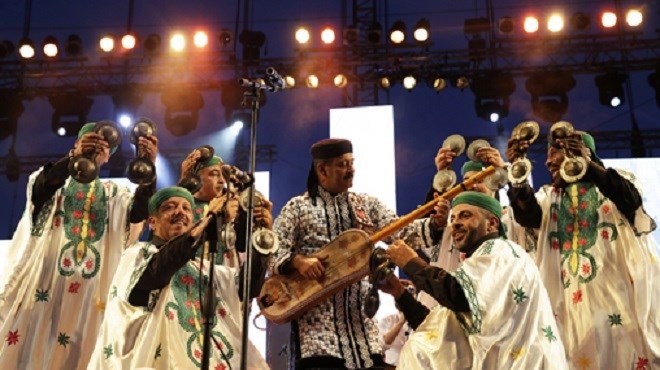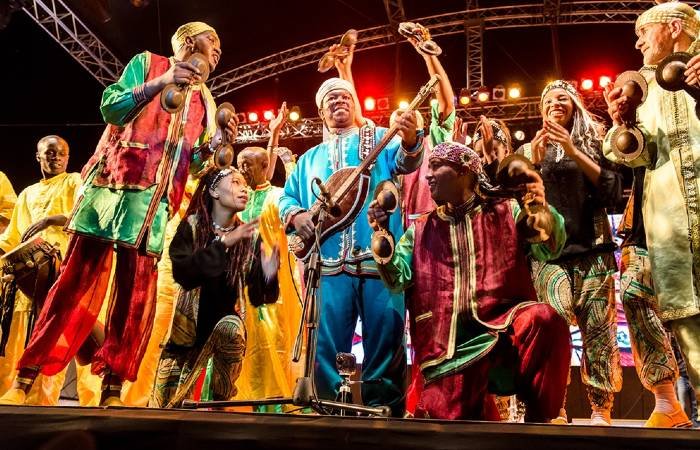Physical Address
304 North Cardinal St.
Dorchester Center, MA 02124
Physical Address
304 North Cardinal St.
Dorchester Center, MA 02124

One of the most vibrant and culturally significant events in Morocco is the Gnawa Festival, held annually in the coastal city of Essaouira. This unique celebration of Gnawa music and heritage draws musicians, artists, and festival-goers from around the world, turning Essaouira into a hub of spiritual rhythms, ancient traditions, and modern artistic expression. The festival is not only a showcase of Gnawa music but also a fusion of diverse world music genres, creating a truly multicultural experience.
Gnawa music originates from the Gnawa people, descendants of West African slaves brought to Morocco centuries ago. The music is deeply rooted in spiritual practices and healing rituals, blending African, Berber, and Islamic influences. It is characterized by hypnotic rhythms, chants, and the use of traditional instruments like the guembri (a three-stringed lute) and qraqeb (metal castanets). Historically, Gnawa music was performed in lila ceremonies, spiritual gatherings meant to heal and connect with ancestors.
Gnawa music is often described as soul-stirring and trance-inducing, and its powerful rhythms are believed to have healing properties. Today, Gnawa has evolved into a popular genre that blends traditional sounds with modern elements, resonating with audiences far beyond Morocco.
The Essaouira Gnawa and World Music Festival was founded in 1998, aiming to preserve and promote the Gnawa heritage while fostering cultural exchange. Over the years, the festival has become a global event, attracting top musicians from Morocco and abroad, as well as tourists, scholars, and music lovers eager to experience its unique atmosphere.
The festival highlights the connection between traditional Gnawa music and other music genres like jazz, reggae, blues, and funk, creating a dynamic fusion of sounds that bridges the gap between ancient and modern. The fusion performances often feature collaborations between Gnawa maâlems (masters) and international artists, offering an extraordinary musical journey that celebrates diversity.
Held over several days in late June or early July, the festival takes place across different stages in Essaouira’s medina, beaches, and public squares. The heart of the festival is in the city’s vibrant Moulay Hassan Square, where the main stage hosts the most anticipated performances. You’ll also find more intimate performances in Sidi Mohamed Ben Abdallah Square and the Bab Marrakech Square.
Throughout the festival, you can expect a mix of:

Essaouira, known for its laid-back vibe and stunning coastal scenery, is the perfect host city for the Gnawa Festival. Its medina, a UNESCO World Heritage site, with its narrow alleys, whitewashed walls, and vibrant souks, offers an intimate backdrop for the festival’s performances. The city has a rich history of artistic and cultural exchange, making it a natural home for a festival that celebrates the fusion of musical traditions.
The cool Atlantic breeze, combined with Essaouira’s artistic atmosphere, creates an inviting and magical setting for festival-goers. Many visitors also take advantage of the city’s beaches, enjoying surfing or kitesurfing when they’re not watching performances.
The Essaouira Gnawa Festival has played a crucial role in promoting cultural exchange between Morocco and the world. By bringing together international musicians and artists, the festival fosters a dialogue between different musical traditions and highlights the global nature of music. It has helped Gnawa music gain international recognition, contributing to the preservation and revitalization of this ancient art form.
In addition to boosting tourism in Essaouira, the festival has also strengthened the local economy by creating opportunities for artisans, performers, and businesses.
The Gnawa Festival is much more than just a music event—it’s a celebration of Morocco’s rich cultural diversity and a testament to the power of music to transcend borders. Whether you’re a fan of traditional music or world fusion, the festival offers an unparalleled opportunity to experience the mystical rhythms of Gnawa alongside other musical styles in the stunning coastal city of Essaouira.
If you’re planning a trip to Morocco, attending the Essaouira Gnawa and World Music Festival is a must. It’s a unique chance to dive deep into the heart of Morocco’s spiritual music and experience a festival like no other.